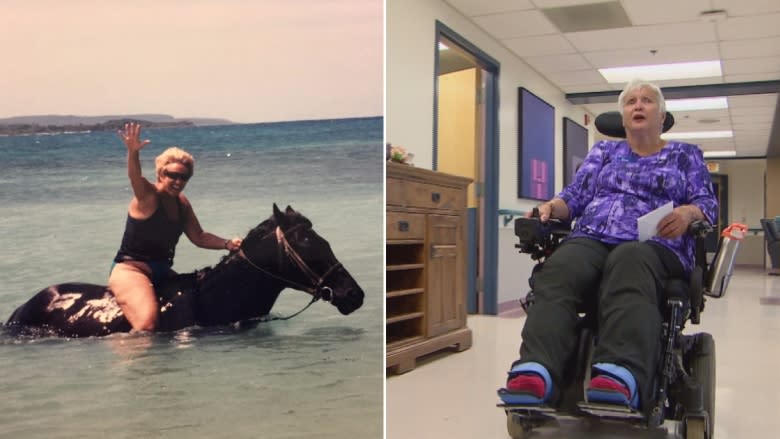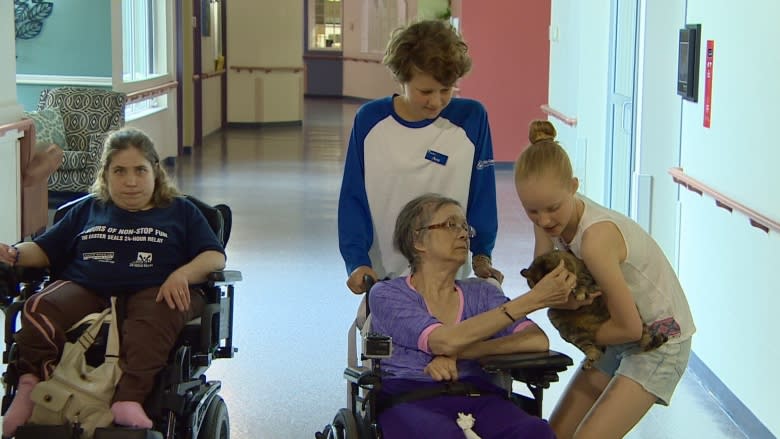Saskatoon program turns long-term care home into Grade 6 classroom
Walking down the hallway of a long-term care home often triggers an urge to whisper for fear of a "shhhhh" from nurses. But that's not the case at the Sherbrooke Community Centre in Saskatoon.
Twenty-five Grade 6 students roam the halls, throwing out waves, hugs and high-fives to residents.
They are taking part in a unique intergenerational program — known as iGen — that embeds an elementary class inside an advanced care home for the entire school year. The Saskatoon program is a first in Canada.
And over the past year, it's changed lives and saved lives.
"It gave me a reason to get up in the morning, and an enthusiasm for life that I hadn't had," care home resident Jodi Grant told CBC News.
In fact, the 69-year-old is blunt about the fact that just a few years ago, she wanted to die.
Losing her will to live
For decades, Grant taught literacy in schools. She earned a PhD and became a professor, first at the University of Saskatchewan and then the University of West Indies in Jamaica.
She was living the life of her dreams until a horrific vehicle accident in 2007 fractured her spine and left her in excruciating pain, unable to get out of bed alone or bathe herself.
"I was completely depressed. All I wanted to do, really, was die," Grant said.
When the accident first happened, she remembers begging her son for his eyeglasses. "I wanted to break them and cut my jugular. I just wanted to die."
Grant spent two years in a Saskatoon hospital, then moved into Sherbrooke for full-time medical assistance. The facility has 260 residents, including seniors and people with acquired brain injuries. Sherbrooke likens itself to a "small town" that helps residents stay active with a greenhouse, art studio, dance hall, swimming pool, pets and more.
Yet Grant said she had lost her purpose in life.
"It was completely boring. It was just dead," she said.
But in 2014, Saskatoon teacher Keri Albert came to her with an idea. Albert wanted to create an intergenerational classroom inside the care home, with people of all ages and abilities.
A first in Canada
As a young girl, Albert admired her grandfather, who had multiple sclerosis, and his work with her grandmother to change perceptions and create opportunities for those with varying abilities.
When Albert started her career as an elementary school teacher, she started bringing young kids into the Sherbrooke Community Centre for a few hours at a time to do art projects with residents.
But she soon proposed something much bolder: a full-time Grade 6 class stationed inside the home all school year.
"We would create an environment where elders and students could reciprocate care — could give and receive care to each other," Albert said. "We could find out what an elder's passion and interest is, and match them with a student with a common passion and interest."
The Saskatoon Public School Division and Sherbrooke administration embraced the idea. The first iGen class started in 2014, with 22 students coming from all over the city.
There isn't a traditional classroom with desks. Rather, students do most of their learning or projects at various locations in the care home, often working side by side with elders.
Combating the 3 'plagues'
The program has brought a new energy to the place, says nursing director Deb Schick, and it helps the care home prevent the so-called "three plagues" that kill elders: helplessness, boredom, and loneliness.
"Loneliness is killing our seniors," Schick told CBC News. "This is the way to combat that — to bring kids, the generations together."
Albert quickly realized how much wisdom and experience Jodi Grant had to offer the students and recruited her to volunteer teach. Now, most days, Grant steers her motorized wheelchair down the hall to the students, cracks open a book, and reads aloud to them for a half-hour.
Grant says she gets excited to introduce them to literature and fictional worlds. She's also touched by how they respond to her.
"Some of these shy kids, who wouldn't look me in the eye, wouldn't get near me, are coming up and giving me hugs."
As for the students, they learn from the elder's life experiences, but also gain a sense of empathy and compassion.
"They see the human spirit. They see that if your body doesn't look like mine, that is OK," Albert said. "I get teary talking about it, because it really is the most powerful thing."
Changing lives, saving lives
Twelve-year-old Liv Anderson scoops up an orange cat that's strolling the halls and takes it over to a woman in a wheelchair so they can pet it together.
"I see everything with new eyes," Anderson said. "You can love a stranger just by looking them in the eyes."
Schick watches the residents interact with the students; the iGen program has become personal for her this year. She enrolled her daughter in the program to help teach her empathy. But Schick acknowledges it has also opened her daughter up to pain when one of the residents dies.
"It can be quite traumatic for them. They may not have ever had anyone pass away in their lives. So this is their first experience with death," Schick said, noting she helps counsel the students through it.
"But it's also very real," Albert adds. "And one of the things, when we talk about iGen, we talk about it being the school of real life."
For Grant, the program has taught her that life goes on and it's possible to find joy again — and that's a lesson she says she's all too eager to share with the students.
"I kept on," she says. "Life is worth living when you find your place. I found it again here."
iGen is now so popular, the school division had to use a lottery system to select students for the coming school year.





